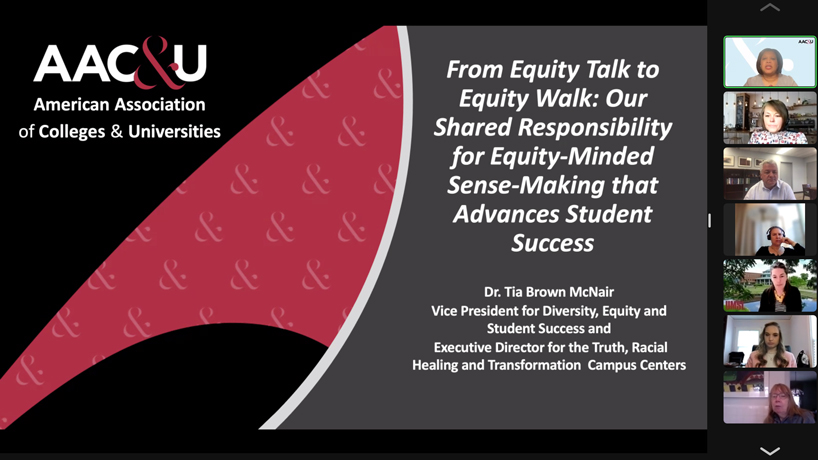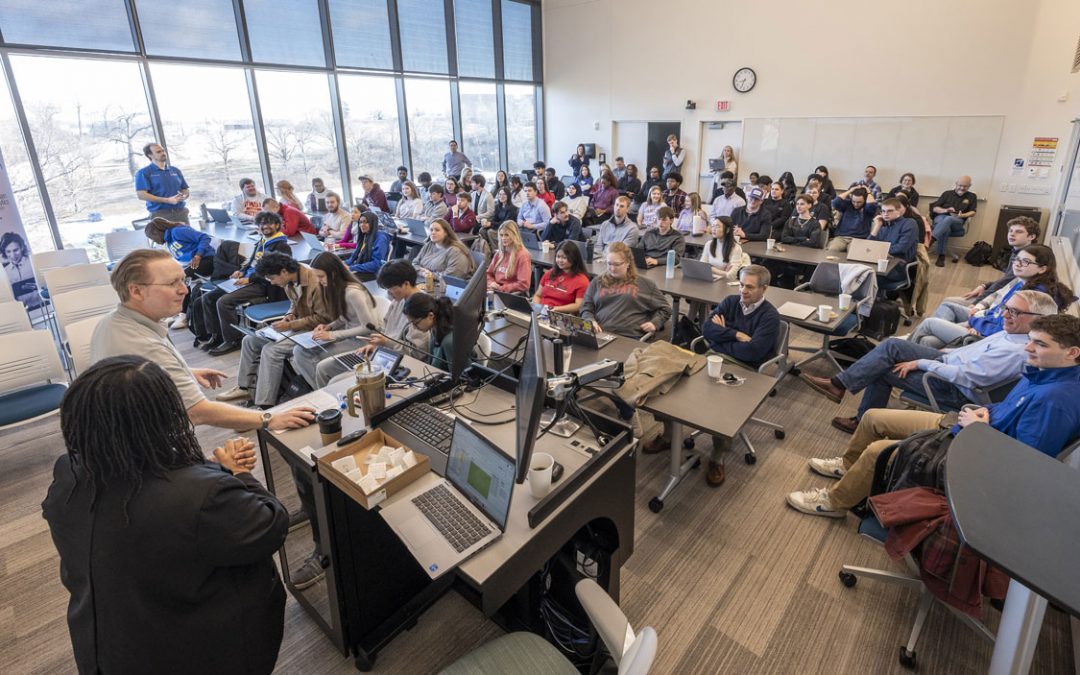
Tia Brown McNair (top right) delivered the keynote presentation during the Spring Forum on Teaching, held via Zoom on Jan. 27. (Screenshot)
Faculty members at the University of Missouri–St. Louis share a commitment to promoting equity.
That can require educators to question their own assumptions, recognize stereotypes that might prove harmful to student success and to constantly reassess their practices as they look to make change.
It was in that spirit that about 100 faculty members took part in the Center for Teaching and Learning’s Spring Forum on Teaching, titled “From Equity Talk to Equity Walk,” held virtually on Jan. 27.
“The goals of the forum are to bring together the teaching community at UMSL, learn from leaders in the field and highlight the amazing work of faculty, staff and students happening on our campus,” said Erin Whitteck, an assistant director of the Center for Teaching and Learning, who organized the forum in its 14th year.
Tia Brown McNair, the Vice President in the Office of Diversity, Equity, and Student Success and Executive Director for the Truth, Racial Healing, and Transformation Campus Centers at the American Association of Colleges and Universities, delivered the keynote address. She highlighted key principles outlined in the book “From Equity Talk to Equity Walk,” which she co-authored with Estela Mara Bensimon and Lindsey E. Malcom-Piqueux.
“One of the things that we say in our book is that to develop as equity-minded practitioners, we really need opportunities to remake practice,” McNair told attendees. “That is why we’re here today. We’re thinking about the wonderful things that you’re doing with high-impact practices, with open-educational resources, with the work that you’re doing on teaching and learning within your classroom and across your departments and your programs.
“But we’re building on that foundation. We’re saying, ‘OK, what is it that we can do to strengthen this work? And how do we move forward?’ So we’re thinking about remaking and strengthening the work that we’re doing.”
McNair discussed some of the points made in the book and shared some high-impact practices that can help students be successful, including first-year seminars and experiences, common intellectual experiences, learning communities, writing-intensive courses, collaborative assignments and projects, undergraduate research, diversity and global learning, service learning, community-based learning, internships, capstone courses and projects and e-portfolios.
She asked educators to evaluate different practices by thinking through questions such as who participates, who doesn’t and why? Are there barriers to participation? Who is benefitting and what are those benefits?
“Our goal when we’re doing this work, from equity talk to equity walk, when we’re doing this work for institutional transformation – whether it’s teaching and learning, students’ access, graduation, retention or whatever – is to make sure that it’s not just a few students who get touched, that it’s not just a small part of the higher education institution that gets changed, that we only utilize just parts and aspects of the research,” McNair said. “But we actually think about what those practices mean at scale for our institution, so that we can have a long-lasting effect, that we can have a longer piece of what it means for institutional transformation.”
McNair’s talk set the stage for the rest of the forum, which included a workshop facilitated by Mary-Ann Winkelmes, the founder, director and principal investigator of the Transparency in Learning and Teaching in Higher Education project. The project, known at TILT Higher Ed, promotes direct conversation between teachers and students about methods of teaching and learning. It also helps faculty deploy education practices that are grounded in evidence about students’ learning.
There were also breakout sessions, led by UMSL faculty and staff members, covering topics such as the Tritons as Partners, which pairs faculty members with undergraduate students who observe their teaching and make reflections that are shared in weekly meetings between the two. Other topics included adjusting assignment instructions in ways that can promote students’ understanding of how they learn while reducing inequities; and how open educational resources in higher education can be used to promote educational equity.














